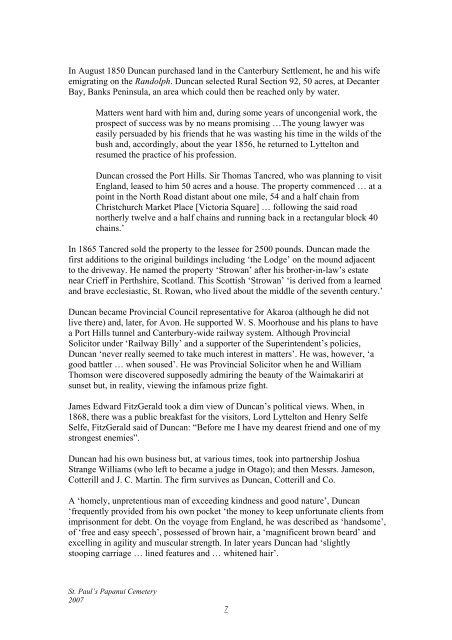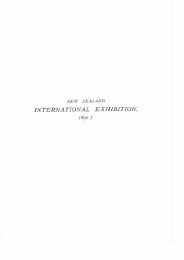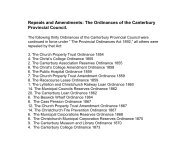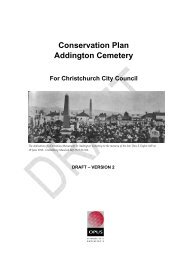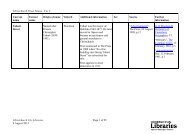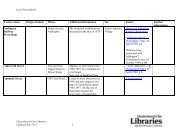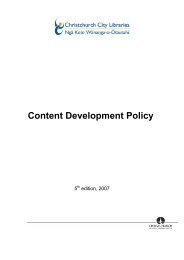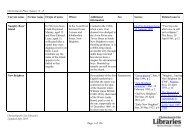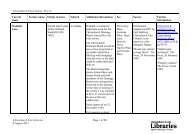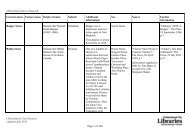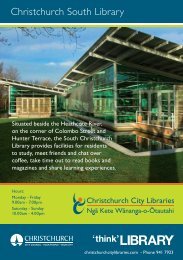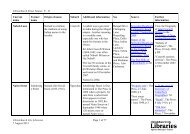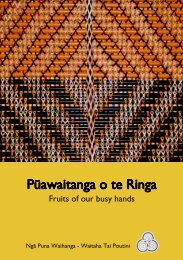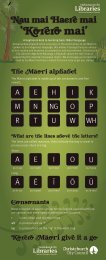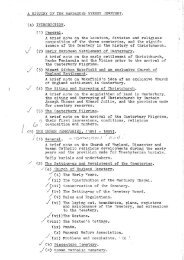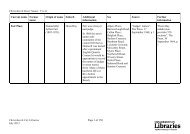St Pauls Papanui Cemetery - Christchurch City Libraries
St Pauls Papanui Cemetery - Christchurch City Libraries
St Pauls Papanui Cemetery - Christchurch City Libraries
Create successful ePaper yourself
Turn your PDF publications into a flip-book with our unique Google optimized e-Paper software.
In August 1850 Duncan purchased land in the Canterbury Settlement, he and his wife<br />
emigrating on the Randolph. Duncan selected Rural Section 92, 50 acres, at Decanter<br />
Bay, Banks Peninsula, an area which could then be reached only by water.<br />
Matters went hard with him and, during some years of uncongenial work, the<br />
prospect of success was by no means promising …The young lawyer was<br />
easily persuaded by his friends that he was wasting his time in the wilds of the<br />
bush and, accordingly, about the year 1856, he returned to Lyttelton and<br />
resumed the practice of his profession.<br />
Duncan crossed the Port Hills. Sir Thomas Tancred, who was planning to visit<br />
England, leased to him 50 acres and a house. The property commenced … at a<br />
point in the North Road distant about one mile, 54 and a half chain from<br />
<strong>Christchurch</strong> Market Place [Victoria Square] … following the said road<br />
northerly twelve and a half chains and running back in a rectangular block 40<br />
chains.’<br />
In 1865 Tancred sold the property to the lessee for 2500 pounds. Duncan made the<br />
first additions to the original buildings including ‘the Lodge’ on the mound adjacent<br />
to the driveway. He named the property ‘<strong>St</strong>rowan’ after his brother-in-law’s estate<br />
near Crieff in Perthshire, Scotland. This Scottish ‘<strong>St</strong>rowan’ ‘is derived from a learned<br />
and brave ecclesiastic, <strong>St</strong>. Rowan, who lived about the middle of the seventh century.’<br />
Duncan became Provincial Council representative for Akaroa (although he did not<br />
live there) and, later, for Avon. He supported W. S. Moorhouse and his plans to have<br />
a Port Hills tunnel and Canterbury-wide railway system. Although Provincial<br />
Solicitor under ‘Railway Billy’ and a supporter of the Superintendent’s policies,<br />
Duncan ‘never really seemed to take much interest in matters’. He was, however, ‘a<br />
good battler … when soused’. He was Provincial Solicitor when he and William<br />
Thomson were discovered supposedly admiring the beauty of the Waimakariri at<br />
sunset but, in reality, viewing the infamous prize fight.<br />
James Edward FitzGerald took a dim view of Duncan’s political views. When, in<br />
1868, there was a public breakfast for the visitors, Lord Lyttelton and Henry Selfe<br />
Selfe, FitzGerald said of Duncan: “Before me I have my dearest friend and one of my<br />
strongest enemies”.<br />
Duncan had his own business but, at various times, took into partnership Joshua<br />
<strong>St</strong>range Williams (who left to became a judge in Otago); and then Messrs. Jameson,<br />
Cotterill and J. C. Martin. The firm survives as Duncan, Cotterill and Co.<br />
A ‘homely, unpretentious man of exceeding kindness and good nature’, Duncan<br />
‘frequently provided from his own pocket ‘the money to keep unfortunate clients from<br />
imprisonment for debt. On the voyage from England, he was described as ‘handsome’,<br />
of ‘free and easy speech’, possessed of brown hair, a ‘magnificent brown beard’ and<br />
excelling in agility and muscular strength. In later years Duncan had ‘slightly<br />
stooping carriage … lined features and … whitened hair’.<br />
<strong>St</strong>. Paul’s <strong>Papanui</strong> <strong>Cemetery</strong><br />
2007<br />
7


